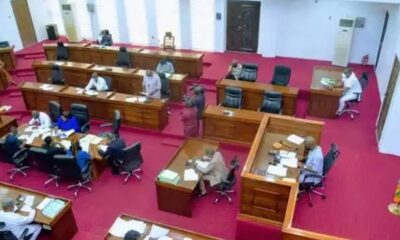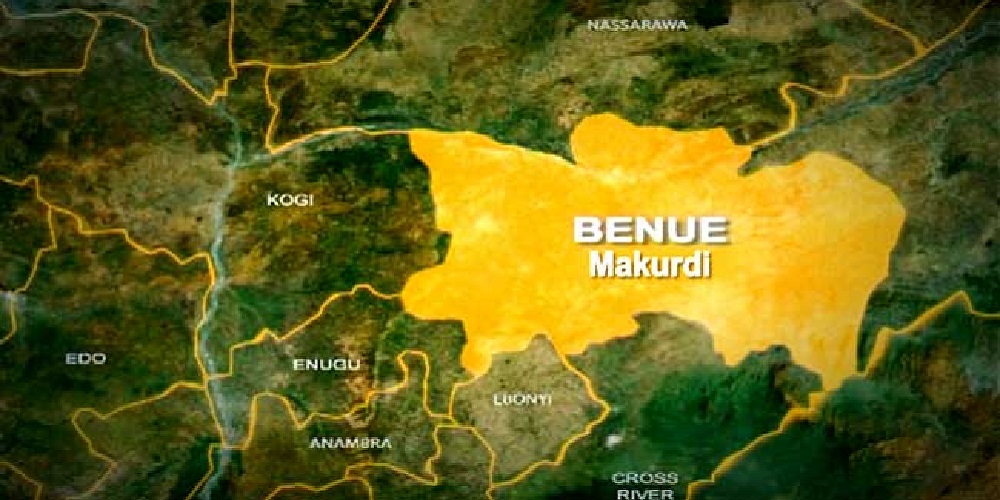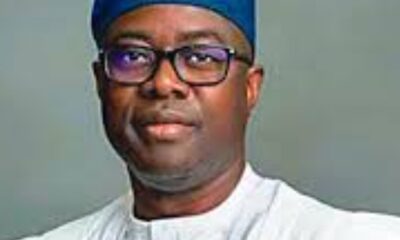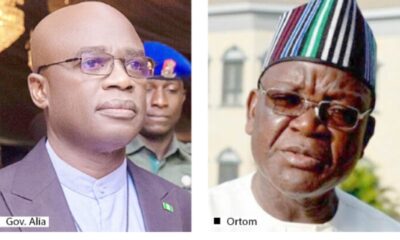News
Alia mourns victims of fatal truck crash in Benue
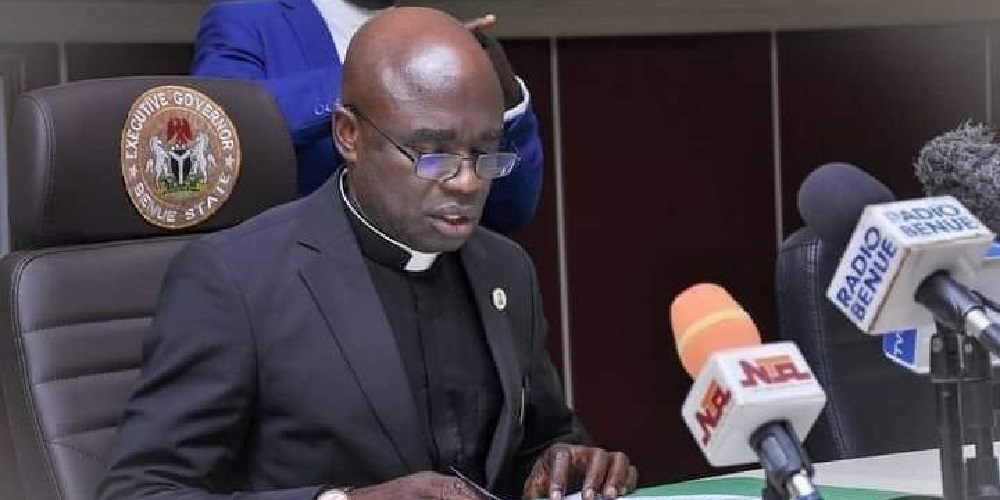
By Francesca Hangeior.
The Governor of Benue State, Hyacinth Alia, has expressed deep sorrow over the death of 10 individuals in a tragic accident in the Okete community, Ohimini Local Government Area of the State.
The unfortunate incident occurred early Thursday when a truck crashed into a building, claiming the lives of no fewer than ten people.
In a condolence message issued through his Chief Press Secretary, Tersoo Kula, Alia said, “It is with a heavy heart that I extend my deepest sympathies to the families affected by the tragic accident in Okete community, Ohimini LGA.
The loss of ten precious lives in such a devastating manner has plunged our state into mourning.
“In these trying times, I want to assure you that the government stands in solidarity with the bereaved families. We share in your pain and pray that you find comfort and strength to bear this loss.”
The governor further assured the public that the state government is committed to conducting thorough investigations to prevent future occurrences of such tragic incidents.
He also prayed for the souls of the departed to rest in peace and for God to grant comfort and strength to the grieving families, while calling on friends and community members to support the affected families during this difficult time.
News
NAHCON airlifts 14,165 pilgrims in five days

The National Hajj Commission of Nigeria (NAHCON) said it has airlifted 14,165 pilgrims in five days.
This, the commission said, represents 34.4 per cent of the total pilgrims for this year’s edition.
A statement by Assistant Director, Information and Publication, Fatima Sanda Usara, said the figure is an improvement from last year’s 20.2 per cent of pilgrims with 23 flights transported 9, 788 pilgrims.
She listed the States that have concluded their airlift to include Oyo, Abia, Kogi, and Nasarawa States.
Meanwhile, Ondo and Ekiti States are preparing for their final flights, which will be undertaken as a combined airlift.
The commission said: “Importantly, no flight cancellations have been recorded so far. On the contrary, one of the carriers transporting pilgrims from Niger State arrived in Saudi Arabia earlier than expected as a mark of diligence. The commission commended its staff for their prompt action and being up to task.
“NAHCON attributes the continued success of the airlift operations to the full cooperation from the State Pilgrims’ Boards, and the wisdom in engaging four airlines for this year’s airlift. The air carriers have been doing their best to fulfill the terms of engagement they signed with NAHCON. “Additionally, Saudi Arabian authorities have released full flight schedules to all participating airlines, which further facilitates proper planning and timeliness. All flights are currently landing in Madinah, in line with the agreed plan.”
She said the first set of pilgrims that arrived the Kingdom are now in Makkah to commence their Umrah for those who select Hajj Tumattu’i or Qiran.”
News
Court dismisses First Bank’s applications in suit against GHL

The Federal High Court in Port Harcourt has dismissed three motions on notice by First Bank of Nigeria Limited against General Hydrocarbons Limited (GHL).
Other respondents in the suit numbered FHC/PH/CS/02/2025 are the Cargo of Crude Oil on Board FPSO Tamara Tokoni, Owners/Operators of the FPSO Tamara Tokoni and the Master.
Justice E. A. Obile ruled on an application by First Bank, through its counsel, E. C. Unachukwu.
The judge ordered: “That the application to withdraw Motions on Notice dated and filed 25th March, 2025; dated and filed on 28th March 2025 and dated and filed on 2nd April, 2025 is granted as prayed.
“That the applications are hereby dismissed accordingly.
“That Deputy Chief Registrar/Admiralty Marshall is directed to serve parties who apply for the orders of the court with same, including the instant order.
“That the application for costs is refused.”
The order was made on April 29.
Justice Obile had in March dismissed First Bank’s suit against GHL on the grounds that the court was bereft of the requisite jurisdiction to entertain it.
He upheld the arguments of counsel to GHL, Dr ‘Biodun Layonu (SAN), and GHL’s notice of preliminary objection challenging the court’s jurisdiction to entertain the suit.
It dismissed the entire suit as an abuse of the court process and a breach of the orders of Ambrose Lewis-Allagoa, made on December 12, 2024, in suit FHC/L/CS/1953/2024.
The court held that First Bank conceded in paragraphs 18 and 19 of its counter-affidavit opposing the defendants’ notice of preliminary objection that the order made by Justice Lewis-Allagoa restrained it from enforcing any receivables arising from the facility agreement entered into by the parties.
The court further held that the plaintiff’s attempt to distinguish the instant suit from the one numbered FHC/L/CS/1953/2024 could not stand.
It maintained that every subsequent agreement entered into by the parties was pursuant to the legally enforceable Memorandum of Understanding between GHL and FBN.
The court consequently held that by the instant suit, First Bank approached the court to do the very act that Justice Lewis-Allagoa had restricted it from doing, and as such, the suit was a classic case of abuse of court process, and consequently dismissed the suit.
The court also upheld the argument of GHL that the ex-parte orders of January 9 had lapsed by operation of law.
These are: “An order to arrest and/or attach or lien the entire cargo of crude oil on board the Floating Production Storage and Offloading (“FPSO”) vessel Tamara Tokoni;
“An order directing the officers of the Nigerian Navy, NUPRC, NIMASA, Harbour Master of the Nigeria Ports Authority to render necessary assistance to the Admiralty Marshall of the Court in giving effect to the order of arrest made in (a) above.”
The court held that the orders had lapsed automatically by effluxion of time and consequently set them aside.
News
DSS drags Pat Utomi to court over shadow govt formation
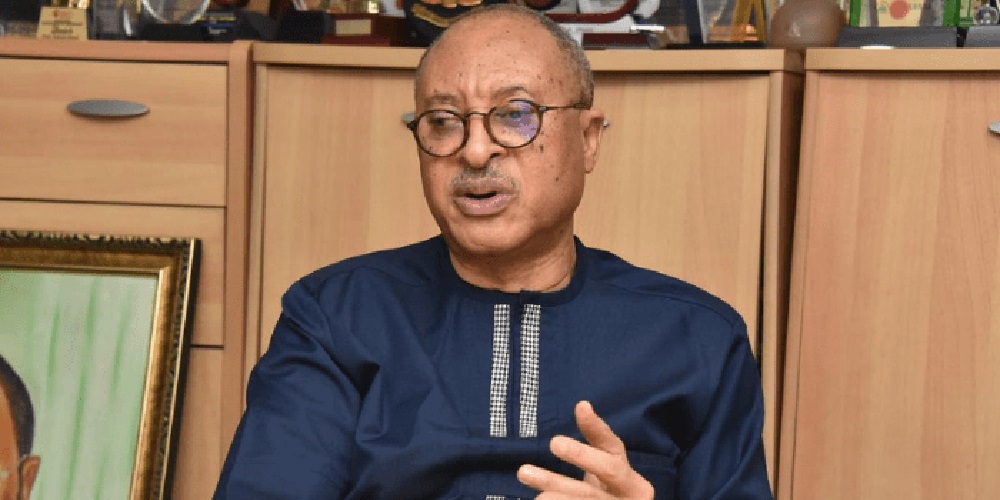
The Department of State Services has dragged a former presidential candidate, Prof. Pat Utomi, before the Federal High Court in Abuja over his recently formation of a shadow government.
In the suit marked FHC/ABJ/CS/937/2025, the DSS named Utomi, the 2007 presidential candidate of the African Democratic Congress, as the sole defendant, accusing him of attempting to unlawfully usurp the executive powers of President Bola Tinubu.
Utomi had recently unveiled a 39-man shadow government, saying it was necessitated by the alleged poor handling of governance by President Tinubu-led Federal Government.
While the Federal Government and the ruling All Progressives Congress condemned the move, Utomi insisted that he acted within his constitutional right.
However, in a suit filed through its lawyer, Akinlolu Kehinde (SAN), the DSS described Utomi’s shadow government illegal and an attempt to instigate public disaffection against President Tinubu.
According to the DSS, Utomi’s shadow government or cabinet, being amounts to operating as an alternative government, contrary to the provisions of the 1999 Constitution of the Federal Republic of Nigeria.
The DSS contends that Utomi, through public statements, social media, and other platforms, announced the creation of the shadow government to challenge the legitimacy of the democratically elected government of President Bola Tinubu.
According to the DSS, during the inauguration of the ‘shadow cabinet’, Utomi reportedly stated that it includes the Ombudsman and Good Governance portfolio to be led by Dele Farotimi; a Policy Delivery Unit team comprising Oghene Momoh, Cheta Nwanze, Daniel Ikuonobe, Halima Ahmed, David Okonkwo, and Obi Ajuga; as well as a Council of Economic Advisers.
The DSS stated: “Based on the intelligence gathered by the plaintiff, the activities and statements made by the defendant and his associates are capable of misleading segments of the Nigerian public, weakening confidence in the legitimacy of the elected government, and fuelling public disaffection.”
It added that the shadow government, if left unchecked, could destabilise the country, incite political unrest, and threaten national security by creating chaos.
The agency claimed that such a structure could stoke inter-group tensions and embolden unlawful actors or separatist movements to form similar parallel arrangements, posing a significant threat to national security.
“The plaintiff, in the discharge of its statutory duties, has gathered intelligence confirming that the defendant’s actions pose a clear and present danger to Nigeria’s constitutional democracy.
“The defendant’s actions amount to an attempt to usurp or mimic executive authority, contrary to Sections 1(1), 1(2), and 14(2)(a) of the 1999 Constitution (as amended), which exclusively vests governance in institutions duly created under the Constitution and through democratic elections.
“The Federal Government of Nigeria has made several efforts to engage the defendant to dissuade him from this unconstitutional path, including statements made by the Minister of Information, but the defendant has remained defiant.
“It is in the interest of justice, national security, and the rule of law for this honourable court to declare the existence and operations of the defendant unconstitutional and illegal,” the DSS submitted.
The service further described Utomi’s shadow government as not only an aberration but also a grave attack on the Nigerian Constitution and a threat to the democratically elected government.
Among its requests, the DSS asked the court to declare the purported “shadow government” or “shadow cabinet” as unconstitutional, arguing that it constitutes an attempt to establish a parallel authority not recognized by the 1999 Constitution.
The DSS also prayed the court to affirm that, under sections 1(1), 1(2), and 14(2)(a) of the constitution, the creation or operation of any governmental authority or structure outside constitutional provisions is unconstitutional, null, and void.
Additionally, it sought “an order of perpetual injunction restraining the defendant, his agents, and associates from taking any steps towards establishing or operating a ‘shadow government,’ ‘shadow cabinet,’ or any similar entity not recognised by the Constitution.”
In support of its suit, the DSS highlighted Section 1(1) of the 1999 Constitution (as amended), which establishes the Constitution’s supremacy and binding authority over all persons and institutions in Nigeria.
It also cited Section 1(2), which prohibits governance outside constitutional provisions, and Section 14(2)(a), which affirms that sovereignty belongs to the people.
The agency argued that Utomi’s initiative lacks any legal legitimacy and violates multiple constitutional provisions.
In an affidavit attached to the suit, the DSS identified itself as Nigeria’s principal domestic intelligence and security agency, statutorily mandated to detect and prevent internal security threats, including subversive activities that could undermine national unity and order.
It stressed its duty to safeguard the nation by preventing threats to the lawful authority of the Federal Republic of Nigeria and its institutions.
The DSS reiterated that Utomi had publicly announced the formation of a shadow government comprising individuals assigned to various ministerial roles.
The court has yet to fix a date for the hearing.
-

 News21 hours ago
News21 hours agoJust in: NNPC Cuts Petrol Price Amid Competitive Moves with Dangote Refinery
-

 News15 hours ago
News15 hours agoJust in: FG receives Wigwe’s helicopter crash report from NTSB
-

 Entertainment16 hours ago
Entertainment16 hours agoSAD ! Popular Nollywood actress, Monalisa Stephen is dead
-

 News19 hours ago
News19 hours agoSAD! Popular Broadcast Journalist Bukola Agbakaizu Slumps, Dies Before Afternoon Shift
-

 News15 hours ago
News15 hours agoJust in: Tinubu’s son Seyi, Tops Controversial List As Lagos Guber Race Ignites Political Wahala
-

 News18 hours ago
News18 hours agoPDP headache: Saraki’s Cttee signals there’s genuine intention to reconcile and resolve knotty issues -Hon Teejay Yusuf
-

 News22 hours ago
News22 hours agoBUNKERING: Army, Tantita Security Arrest Truck Laden with Illegally Extracted Crude Oil in Delta
-

 Economy19 hours ago
Economy19 hours agoSEE Current Black Market Dollar (USD) To Naira (NGN) Exchange Rate




